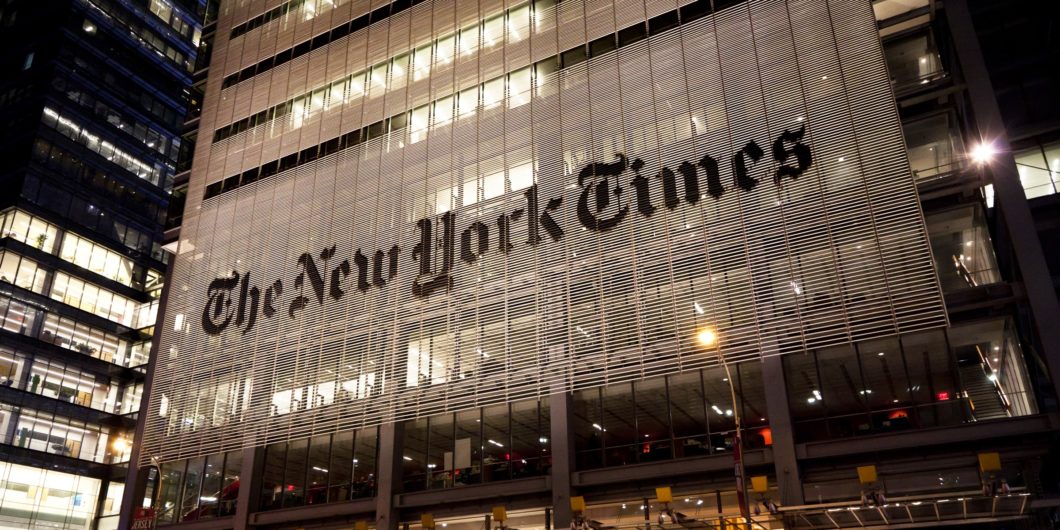The America the New York Times Wants
From the very beginning of the country, there has been disagreement about the meaning of America, but not until fairly recently in our history have there been outright calls for actually changing the American narrative. That sort of message only became popular with Progressivism in the early part of the 20th century.
More specifically, it came with Woodrow Wilson’s call to replace an earlier Jeffersonian liberalism with a new kind of liberalism, one that would explicitly recognize the role of the expert in government to navigate society through the complexities of modern life. The older ways of reading the U.S. Constitution, Wilson very explicitly articulated, had to give way to intelligent administration.
In the classic history of that era, The Age of Reform, Richard Hofstadter argued that Wilson had tapped into a deep-seated anxiety prevalent among middle-class professionals at a time when they felt robbed of their rightful place in society by the increasing specialization and massification of American life. Professionalism, expertise, and management have been the essential leitmotifs of Progressivism ever since.
It is interesting, though, that most present-day progressives cannot run fast enough away from President Wilson, even though they too call for expert management, and like him are bold to assert the need to change the American narrative. This is certainly the case with the New York Times which endorsed Wilson both in 1912 and 1916, but decries his legacy these days. The Times can no longer invoke its own venerable progressive past because it no longer fits the current narrative.
You see, Wilson was a racist of a very systematic, “expert” sort, and so too were the “experts” of his day which progressives (like the Times) sought to empower. Rather than question the problematic nature of tying expertise to power, however, our modern-day progressives simply airbrush their forebear out of history. It’s what one does when changing narratives. You remove the uncouth from the family album. But you keep the power, keep the enthronement of expertise as you like it, and march forward at double-time, never looking back.
The first object of any would-be purveyor of power is to shut down all scrutiny of itself.
In their April 9 editorial, “The America We Need,” the Times editorial board fails to reckon with their own progressive history, even as the article remains progressivist to the core. Like Wilson’s “New Democracy,” the Times seeks to reorder American life along certain lines supposedly more in keeping with modern democracy and material equality, using the coronavirus crisis as a useful wedge. But the article takes a very peculiar turn. The board asserts that the current fragility of American life and institutions is “the product of deliberate decisions” that have “perpetuated the nation’s defining racial inequalities,” without any acknowledgment that the present welfare system is the product of the progressive tradition the Times itself has long championed.
Following a brief but vitriolic indictment of the housing and transportation policies of the 60s, for instance, one would never know that these were the hallmark programs, not of the founding narrative of individual liberty and constitutional constraint, but of the later progressive narrative of the Great Society! “The America We Need,” however, spares no effort to sling verbal effluent on the advocates of limited government and personal freedom as the champions of “wealth and privilege,” and “racial inequalities,” who deliberately trap “children and their children’s children” in poverty. If they weren’t so sanctimoniously earnest, you would think this was the beginning of the new tales of Scrooge. But they are deadly serious and deeply wrong.
Not only do they airbrush progressive history, but they also pass over the mountains of conservative and classical liberal scholarship on the problems of our institutional life that have been the hallmark of solid economic and political analysis of the progressivist state. They have set aside the explicit attacks on institutional racism, the hammering critiques of distortionary regulations, and the entire body of evidence indicting “crony capitalism.”
This very valuable and essential voice needs to be part of the current conversation. Only a vetting from a tradition that has been consistently holding government authority to account (and sorting through the mess of our current policy responses) can keep political power honest.
But rather than keep the channels of communication and debate open, the members of the Times editorial board seek to shut it down. Instead of bringing us together, something they frequently complain the administration in Washington fails to do, they are themselves promulgating division.
In addition to airbrushing out portions of the progressive past which they once supported, they airbrush out all memory of the genuinely leftist roots of much of the limited government tradition. The very idea of crony capitalism, for instance, can be traced back to such left-wing works as Bertram Gross’ Friendly Fascism and Gabriel Kolko’s Triumph of Conservatism.
Both writers had noticed an inescapable fact of the modern national bureaucratic state: It invariably serves entrenched well-heeled economic interests. Many an old-left advocate of genuine equality and freedom was drawn to the limited government fold from following the leads of these writers. Recognizing the inherent tension in the progressivist claim that society could be restructured by experts yet remain egalitarian, their point was to limit the coercion that organized interests could wield in society. The Times editorial board members acknowledge none of this diversity in the lineage of their imagined opponents.
The first object of any would-be purveyor of power is to shut down all scrutiny of itself. Rather than foster a debate, as one ideally should expect of a daily worthy of the appellation of “newspaper,” the Times has rather retarded and hindered it, raising the natural question of the editorial board’s motives. Deliberate distortion weakens us as a country, and that is a sad additional cost we now must overcome in a crisis that has already cost everyone too much.

